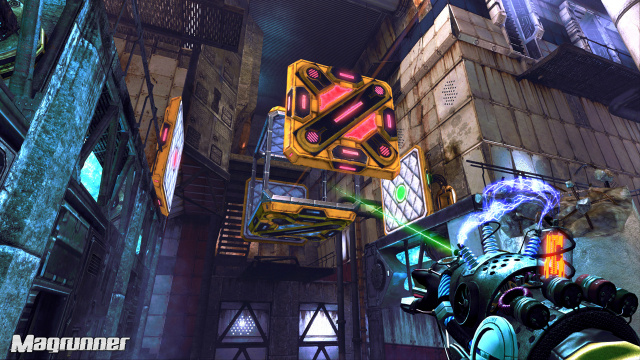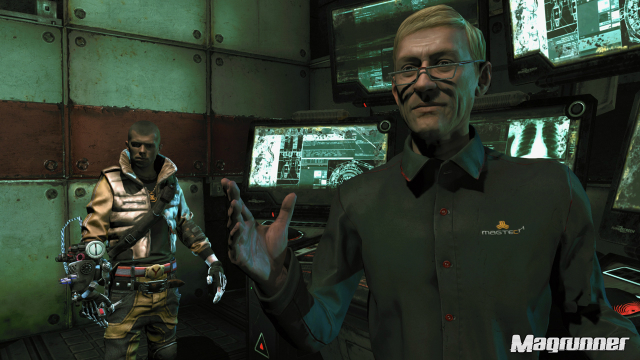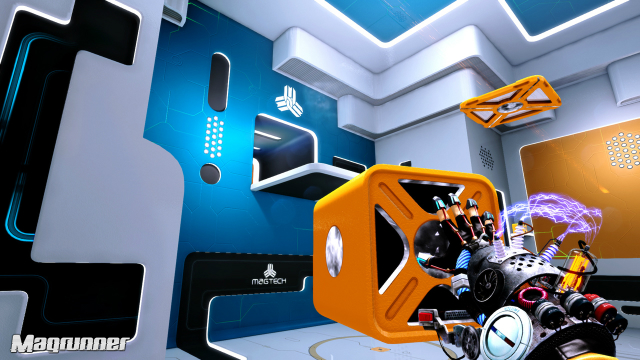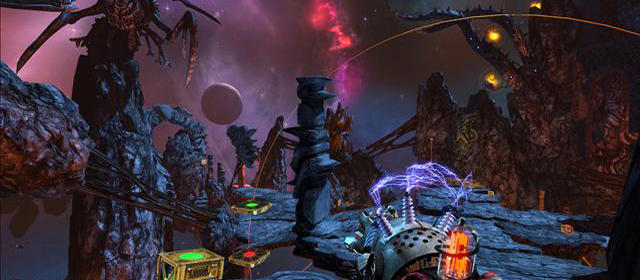As games pitches go, the idea of combining mind-bending Portal-style first-person puzzles with the arcane terror of HP Lovecraft’s Cthulu Mythos has to be one of my favourites in recent years. Kickstarter patrons agreed with me and voted with their cash money– which is just how 3AM games ended up being in a position to craft MagRunner: Dark Pulse.
If you haven’t had to the chance yet, then I would suggest you investigate the tantalising preview videos floating around the internet to get an idea of what we are dealing with here. You will see how a fairly anodyne opening section places you in a Portal-esque futuristic setting littered with physics-based puzzles, before startling, jarring rifts in the space-time continuum open up, transporting you into a nightmarish parallel universe, where steampunk aesthetics clash with some of the most unsettling interpretations of Lovecraft’s horrors ever seen in a video game. It looks thrilling, it looks original, and it makes me very excited to try out the finished product which is due to hit PlayStation Network, Xbox LIVE Arcade and PC soon.
Being a huge fan of HP Lovecraft, and someone who is very much looking forward to getting to grips with the game, it was a thrill when Douglas Burchill from 3AM games agreed to answer some questions for me, which will give GodisaGeek readers a unique insight into how MagRunner came to be, as he talks through just how the legendary fantasy writer inspired the developers, talks a little about other fantasy gaming media influenced their work, made me want to pay another visit to Adrian Lyne’s excellent Jacob’s Ladder, and tried to help a dopey layman like myself understand how all this physics malarkey actually works. I hope you enjoy it.

I am a huge fan of HP Lovecraft. Given how the writer himself encouraged use, expansion and interpretation of his Cthulu Mythos, what do you think he would make if he could have played Magrunner?
I think Lovecraft would be amazed at the social technology we have and where we’re headed. He was a fairly isolated guy, but heavily into collaborating and corresponding with other writers. In this day and age, there’s so many Mythos and Lovecraft sites out there that I’m sure he’d be thrilled to see how popular his creations have become.
Oddly enough, it’s not our first game dealing with the Mythos; in 2006 we released Sherlock Holmes : The Awakened, in which the master of deduction investigates a case dealing with supernatural powers and cultists. We had a lot of fun creating the game and we wanted to repeat the experience at some point.
As for Magrunner, I think he would definitely appreciate the way we’ve integrated his Mythos into future technologies based on what we have today. I know we made a real effort to envision how some of his tales may have unfolded in a futuristic setting and what the results would be.
Watching some of your presentation videos I notice a few tell tale signs of old-school RPG/board games fandom in the background (a Talisman box!). What kinds of things are you guys into and what influenced you, growing up?
I still have a closet and attic full of everything Games Workshop ever made (major 40k freak) and I know a lot of the other guys at the studio are gamers. One of the things that intrigued me about Magrunner was the Cthulhupunk aspect. Back in the 90’s, I had cobbled together a home-brew rpg of Call of Cthulhu and Dark Conspiracy that was a big hit among the cellar dwellers. We try to indulge in as much high-geekery as we can with comics, movies, rpgs and, of course, video games. But the major influence was always role playing games, and I think it really allowed a creative outlet to tell stories, which is what we enjoy most.

Your game combines sleek, futuristic design with some cracking steampunk elements, and of course the oozy, tentacle-y goo of the Lovecraftian horrors. Did you design the game as such, or did it perhaps begin as something more conventional?
We thought about a kind of cyberpunk game with Cthulhu at the beginning, but we weren’t sure we could make it work. We wrote the first draft of the story, and knew we had something here. After we had the Lovecraft elements in place, we worked on predicting aspects of globalization, social networks, the end of nations and states…not really that much of a challenge when you take a look at the world today. In the end, the problem wasn’t having enough story, but rather too much. We had this big dark world on the edge of oblivion that we had to condense into the game. And there’s a nice contrast between a shiny, corporate future and slime-dripping monstrosities…or maybe it’s a similarity, I’m not sure.
For my money, the works of Lovecraft have always been under-represented in games. Hell, even in movies. What are some of your favourite Lovecraftian interpretations within other media?
There are actually quite a few, if you look deep enough. Some of the guys around here point to the movies Jacob’s Ladder and Necronomicon. Yeah, I’d say anything with Jeffry Combs. Carpenter’s In The Mouth of Madness. Alan Moore did something amazing and disturbing with his graphic novel Neonomicon. As far as games: Prisoner of Ice and Alone in the Dark 1 and 2, and of course Dark Corners of the Earth a few years back. Actually, I’d say any media that you can find a Lovecraft reference is pretty cool. Hell, even South Park did it!

There have been some lazy comparisons made between Magrunner and Portal. This is understandable – both feature first person puzzling action. How much of an influence was Portal or other games within the genre like Quantum Conundrum, in making Magrunner?
Portal defined the genre for first person puzzlers. They existed, but with a very limited audience. For our studio, which was used to creating investigation games, it was a good way to create something more dynamic without involving ridiculous violence on the part of the protagonist.
That said, physics puzzles are always interesting. There are quite a few on mobile platforms, but not many first person puzzle games on PC or major platforms. And while Portal showed us how good it can be, a puzzler game requires a lot of fine tuning and balance, maybe more than our previous games. We worked a lot with focus testers, and that was also one of our reasons to go with crowdfunding – we wanted to bring some players inside the production and have their feedback.
Looking at videos of your game, as a luddite outsider, it baffles me how you come up with the ideas for the physics-based puzzles, the way things interact with each other, and how everything works so logically. How do you come up with these puzzles, the traps, the way things are solved? Does the game engine itself help in this regard, or does it take a lot of thought, planning, and application of your own scientific knowledge?
It requires a lot of work with the puzzles; the thing with a game like Magrunner is that the ideal challenge is to be able to think and modify the course of events while in mid air.
Once the player understands what they have to do in a specific situation, it shouldn’t be hard to do it. The testers and backers were very clear that they wanted a challenge in thinking, not in execution.

Does Magrunner feature much emphasis on story and characterisation, or were you focused primarily on action?
With any kind of media you’ve only got a certain amount of time to tell the story. Since Magrunner is a first person action game, we want to immerse the player in the story from the beginning. Everything and everyone has a very visual character, including the environments. We also wrote a very dynamic story that’s brought to life by some phenomenal voice actors who really got into the characters. It’s a nice mix of addictive gameplay and a story that I don’t believe anyone has seen yet.
Can you tell us what sorts of ideas you have floating about, and what we can look forward to next from you guys?
Well, after Magrunner, we’ve got to wrap up the next Sherlock Holmes game: Crimes and Punishments. After that, we’ll see what new kind of trouble we can get into!






